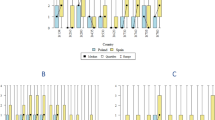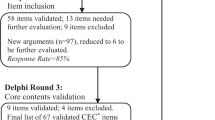Abstract
Study design:
A formal decision-making and consensus process integrating evidence gathered from preparatory studies was followed.
Objectives:
The aim of this study was to report on the results of the consensus process to develop the first version of a Comprehensive International Classification of Functioning, Disability and Health (ICF) Core Set and a Brief ICF Core Set for individuals with spinal cord injury (SCI) in the early post-acute context.
Setting:
The consensus conference took place in Switzerland. Preparatory studies were performed worldwide.
Methods:
Preparatory studies included an expert survey, a systematic literature review, a qualitative study and empirical data collection involving people with SCI. ICF categories were identified in a formal consensus process by international experts from different backgrounds.
Results:
The preparatory studies identified a set of 531 ICF categories at the second, third and fourth levels. From 30 countries, 33 SCI experts attended the consensus conference (11 physicians, 6 physical therapists, 5 occupational therapists, 6 nurses, 3 psychologists and 2 social workers). Altogether 162 second-, third- or fourth-level categories were included in the Comprehensive ICF Core Sets with 63 categories from the component Body Functions, 14 from Body Structures, 53 from Activities and Participation and 32 from Environmental Factors. The Brief Core Set included a total of 25 second-level categories with 8 on Body Functions, 3 on Body Structures, 9 on Activities and Participation, and 5 on Environmental Factors.
Conclusion:
A formal consensus process-integrating evidence and expert opinion based on the ICF led to the ICF Core Sets for individuals with SCI in the early post-acute context. Further validation of this first version is needed.
Similar content being viewed by others
Log in or create a free account to read this content
Gain free access to this article, as well as selected content from this journal and more on nature.com
or
References
Kennedy P, Lude P, Taylor N . Quality of life, social participation, appraisals and coping post spinal cord injury: a review of four community samples. Spinal Cord 2006; 44: 95–105.
Scivoletto G, Molinari M, Molinari M . Early versus delayed inpatient SCI rehabilitation: an Italian study. Arch Phys Med Rehabil 2005; 86: 512–516.
Sumida M, Fujimoto M, Tokuhiro A, Tominaga T, Magara A, Uchida R . Early rehabilitation effect for traumatic spinal cord injury. Arch Phys Med Rehabil 2001; 82: 391–395.
World Health Organization. International Classification of Functioning, Disability and Health (ICF). WHO: Geneva, 2001.
Cieza A, Ewert T, Üstün B, Chatterji S, Kostanjsek N, Stucki G . Development of ICF Core Sets for patients with chronic conditions. J Rehabil Med 2004; 44: 9–11.
Ewert T, Grill E, Bartholomeyczik S, Finger M, Mokkrusch T, Kostanjsek N et al. ICF Core Sets for patients with neurological conditions in the acute hospital. Disability Rehab 2005; 27: 367–373.
Biering-Sørensen F, Scheuringer M, Baumberger M, Charlifue SW, Post MWM, Montero F et al. Developing core sets for persons with spinal cord injury based on the international classification of functioning, disability and health as a way to specify functioning. Spinal Cord 2006; 44: 541–546.
Zoski K, Jurs S . Priority determination in surveys. An application of the Scree test. Eval Rev 1990; 14: 214–219.
Scheuringer M, Kirchberger I, Boldt C, Hoogland-Eriks I, Rauch A, Velstra I-M et al. Identification of problems in individuals with spinal cord injury from the health professional perspective using the ICF: a worldwide expert survey. Spinal Cord, (submitted).
Post M, Kirchberger I, Scheuringer M, Wollaars MM, Geyh S . Systematic review of concepts used in studies of individuals with spinal cord injury using the International Classification of Functioning, Disability and Health as a reference. Spinal Cord, (submitted).
Kirchberger I, Sinnott A, Charlifue S, Kovindha A, Lüthi H, Campbell R et al. Problems in individuals with spinal cord injury from the consumer perspective: a worldwide qualitative study using the ICF. Spinal Cord, (Submitted).
Kirchberger I, Biering-Sørensen F, Charlifue S, Baumberger M, Campbell R, Kovindha A et al. Identification of problems in individuals with spinal cord injury using the ICF: a worldwide empirical study. Spinal Cord (e-pub ahead of print 15 September 2009).
Lynch AC, Wong C, Anthony A, Dobbs BR, Frizelle FA . Bowel dysfunction following spinal cord injury: a description of bowel function in a spinal cord-injured population and comparison with age and gender matched controls. Spinal Cord 2000; 38: 717–723.
Ullrich PM, Jensen MP, Loeser JD, Cardenas DD . Pain intensity, pain interference and characteristics of spinal cord injury. Spinal Cord 2008; 46: 451–455.
Claydon VE, Steeves JD, Krassioukov A . Orthostatic hypotension following spinal cord injury: understanding clinical pathophysiology. Spinal Cord 2006; 44: 341–351.
Macciocchi SN, Bowman B, Coker J, Apple D, Leslie D . Effect of co-morbid traumatic brain injury on functional outcome of persons with spinal cord injuries. Arch Phys Med Rehabil 2004; 83: 22–26.
Kishi Y, Robinson RG, Forrester AW . Prospective longitudinal study of depression following spinal cord injury. J Neuropsychiatry Clin Neurosci 1994; 6: 237–244.
Fuhrer MJ, Garber SL, Rintala DH, Clearman R, Hart KA . Pressure ulcers in community-resident persons with spinal cord injury: prevalence and risk factors. Arch Phys Med Rehabil 1993; 74: 1172–1177.
Knapik H . The modern rehabilitation of patients with spinal cord injuries. Ortop Traumatol Rehabil 2004; 6: 509–522.
Biering-Sørensen F, Charlifue S, DeVivo M, Noonan V, Post M, Stripling T et al. International spinal cord injury data sets. Spinal Cord 2006; 44: 530–534.
Acknowledgements
This project was funded by Swiss Paraplegic Research, Nottwil, Switzerland. We are grateful for the contributions made by the following experts attending the consensus conference: Lindsay Alford, Lester Butt, Sam S Chan, Guido Deckstein, Wagih El-Masry, Fazlul Hoque, Georgina Ilosvai, Alvydas Juocevicius, Ann-Katrin Karlsson, Shinsuke Katoh, Sanna Koskinen, Klaus Krogh, Jianan Li, Kwan-Hwa Lin, Ana Cristina Mancussi e Faro, Charles Manise, Karen Marshall, Tlhaloganyo Mbalambi, Yuri Moustafaev, Dominick Michael Mshanga, Diana Nix, Ali Otom, Inder Perkash, Kiley Pershouse, Manoj Ranabhat, Gail Richmond, Lalita Thambi, Ha Van Than, Jose M Tormos Munoz, Pat Tracy, Lizelle van der Vyver, Renata Vaughan and Tamara Zamparo. Our special thanks to Monika Scheuringer who was the international coordinator of the preparatory studies for her extraordinary commitment. We thank the working group assistants Jennifer Dunn, Helga Lechner, Hansjörg Lüthi, Joanne Nunnerley and Manuel Zwecker for their support. We also thank Silvia Neubert, Heinrich Gall, Sven Becker, Andreas Leib, Elisabeth Linseisen and Christine Boldt for their invaluable support during the conference.
Author information
Authors and Affiliations
Corresponding author
Additional information
Supplementary Information accompanies the paper on the Spinal Cord website .
Supplementary information
Rights and permissions
About this article
Cite this article
Kirchberger, I., Cieza, A., Biering-Sørensen, F. et al. ICF Core Sets for individuals with spinal cord injury in the early post-acute context. Spinal Cord 48, 297–304 (2010). https://doi.org/10.1038/sc.2009.128
Received:
Revised:
Accepted:
Published:
Issue date:
DOI: https://doi.org/10.1038/sc.2009.128
Keywords
This article is cited by
-
A postpartum functional assessment tool for women based on the international classification of functioning, disability and health
BMC Women's Health (2024)
-
Content validity of the Work Rehabilitation Questionnaire (WORQ) for persons with spinal cord injury: A mixed methods study
Spinal Cord (2022)
-
Utilising International Statistical Classification of Diseases and Related Health Conditions (ICD)-10 Australian Modification Classifications of “Health Conditions” to Achieve Population Health Surveillance in an Australian Spinal Cord Injury Cohort
Spinal Cord (2022)
-
Standard set of network outcomes for traumatic spinal cord injury: a consensus-based approach using the Delphi method
Spinal Cord (2022)
-
Recommendations for standards of physiotherapy care following complete traumatic paraplegia in India
Spinal Cord Series and Cases (2020)



